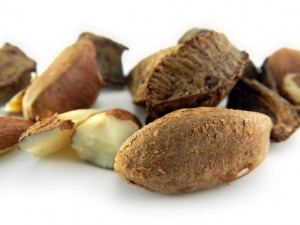Thyroid disease linked to low selenium diet: Study

Thyroid disease is linked to a low selenium diet. The findings come from China, supporting the previous studies conducted on the topic. The findings suggest that adequate selenium content in the diet can help ward off thyroid disease and improve thyroid function.
The study – the first large epidemiological one of its kind – aimed to explore the prevalence of thyroid disease in relation to the amount of selenium found in the soil in two very similar counties in China.
One county was deemed ‘adequate selenium’ and the other was considered ‘low selenium,’ based on the amount of selenium in their soil.
The study looked at a total of 6,152 adults aged 18 to 70 who answered food frequency questionnaires and underwent a clinical examination, thyroid examination, and fasting blood test.
The researchers found the risk of thyroid disease was 69 percent higher among those living in the county with low levels of selenium in the soil. Over 30 percent of those living in the low selenium county had a thyroid disease, compared to 18 percent of those living in the adequate selenium county.
Study author Margaret Rayman said, “Selenium is well known to protect the thyroid. The importance is that we have shown that low selenium is associated with an increased risk of thyroid disease.”
Blood levels of selenium for those living in the adequate selenium county were more than double, compared to those in the low selenium county. Higher blood selenium levels were also associated with a lower risk of autoimmune thyroiditis, hypothyroidism, subclinical hypothyroidism, and thyroid volume.
The authors also noted that consuming meat also reduced the risk of hypothyroidism and subclinical hypothyroidism, but the biggest selenium boost came from consuming green tea, which reduced the risk of hypothyroidism by 38 percent and subclinical hypothyroidism by 45 percent.
Consuming insufficient amount of selenium is a lesser problem in the U.S., but research has still suggested supplementing with selenium, as it has protective effects on the body. However, supplementing selenium through diet is still highly recommended over the selenium supplements in pill form.
Selenium in diet, intake and status
Selenium is an important mineral as it helps your body make special proteins that prevent cell damage and offers protection after you receive a vaccination. Some research has suggested that selenium is protective against certain cancers and cardiovascular disease and that it shields the body from poisonous effects of heavy metals and other harmful substances.
As mentioned, selenium deficiency is quite rare in the U.S., as many food sources provide us with this mineral. Grown foods receive their selenium from the soil in which they were planted. Some good sources of selenium include:
- Plant foods – vegetables
- Brazil nuts
- Fish
- Shellfish
- Red meat
- Grains
- Eggs
- Chicken
- Liver
- Garlic
- Brewer’s yeast
- Wheat germ
- Enriched bread
The recommended daily allowance of selenium for adults is 55 mcg, but the average American actually consumes 108.5mcg, which means we are consuming more than enough to boost our health.
Scientists discover a switch that turns on the thyroid
A recent survey shows that many people with thyroid disease are unaware they have a thyroid problem. This is quite disconcerting, as a hyperactive or a hypoactive (underactive) thyroid can cause many health problems, including mood changes, infertility, weight gain or loss, and even skin conditions. Continue reading…
-
Tips And Advice To Help You Lose Weight
You may be familiar with trying several diets and failing. Many
-
Top Ten Fat Melting Tips for Effective Weight Loss
If you have ever attempted to lose weigh
-
Choose A Good Weight Loss Plan
Cutting down fats means a much complex job that a person has to under
-
How To Break Out Of A Weight Loss Plateau
Try cycling your calories once every 3-to-5 days: If youve been eat
-
Weight Loss Affirmations - Make Them Work For You
As you more than likely already know, practically everybody associates
-
11 Reasons Why Youre Not Losing Belly Fat
V
- DON'T MISS
- Information Regarding Weight Loss Diet
- My Journey - Part 5 - Ever Wondered Why Some People Seem To Eat What They Like And Stay SLIM!
- Conquer Food Cravings
- Best Way to Lose Weight - Which of these 7 Ways to Lose Weight Works Best for You
- Good Diet Plans - The Secrets Of Effective Weight Loss
- Influenza (flu) vs. bronchitis, differences in symptoms, transmission, and treatment
- How To Use Cinnamon For Losing Weight Fast?
- How To Lose Weight And Keep It Off While Eating What You Love
- Diabesity: Don’t Be A Statistic
- Six Snacks that Help Lose the Pregnancy Weight




